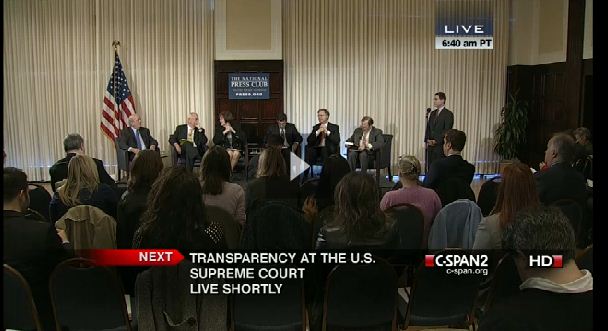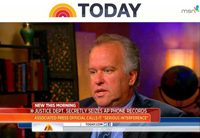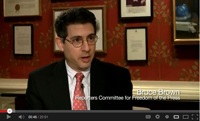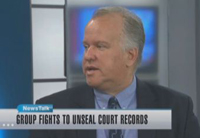Reporters Committee in the news: 2013
U.S. news media urge Parliament to recommit to press freedom on the eve of Guardian hearing over NSA reports
The Reporters Committee was joined by 12 news organizations in a letter to Parliament on Dec. 2, 2013 calling on MPs to reaffirm their commitment to a free press. The letter was sent on the eve of a hearing before the Home Affairs Committee, which heard testimony from Guardian Editor Alan Rusbridger about the paper’s publication of information based on leaked documents from former NSA contractor Edward Snowden. Among the reports mentioning the letter were:
- The Associated Press: “Guardian: We have published 1 pct of Snowden leak,” by Jill Lawless, Dec. 3, 2013
- Frankfurter Allegemeine: “Snowden-Affäre: Unterhaus befragt „Guardian“ – Chefredakteur (Snowden affair: House asked “Guardian” Editor in Chief),” by Jochen Buchsteiner, Dec. 3, 2013
- FreePress: “New struggles in the fight for press freedom,” by Josh Stearns, Dec. 4, 2013
- The Guardian: “Guardian editor Alan Rusbridger appears before MPs – live coverage,” by Paul Owen, Dec. 3, 2013
- The Huffington Post: “Alan Rusbridger’s Parliamentary hearing prompts outrage from press freedom watchers,” by Jack Mirkinson, Dec. 3, 2013
- Los Angeles Times: “Editor of Britain’s Guardian defends publication of NSA files,” by Janet Stobart, Dec. 3, 2013
- The New York Times, The Lede: “The Snowden files, press freedom and Britain,” by Jennifer Preston, Dec. 3, 2013
- Poynter.org Mediawire: “Guardian editor appears before House of Commons Tuesday,” by Kristen Hare, Dec. 3, 2013
Judge orders release of JonBenet Ramsey grand jury documents
Seventeen years after her body was discovered in the basement of her parents’ home, a Colorado judge ruled that grand jury documents in the JonBenet Ramsey murder investigation would be released to the public. The ruling came in response to a lawsuit filed by the Reporters Committee and Daily Camera reporter Charlie Brennan.
“The public has a right to know what the grand jury did and how the prosecutor’s office handled that information, particularly in a case that has gone unsolved for so many years,” said Reporters Committee Executive Director Bruce D. Brown. (“Reporters Committee, journalist fought for release of Ramsey grand jury documents,” Reporters Committee, Oct. 25, 2013)
Brennan wrote: “While grand jury witnesses and their testimony remain shielded for good reason, the ultimate decisions of juries and prosecutors must be public if the people are to retain any faith or trust in the rule of law.” (“Why I fought for the Ramsey indictment’s release,” by Charlie Brennan, The Daily Camera, Boulder, Oct. 25, 2013)
The news received widespread coverage from myriad news outlets. Those that mentioned the Reporters Committee and Brennan’s suit specifically included:
- The Associated Press: “Judge orders release of grand jury indictment in JonBenet Ramsey case,” by P. Solomon Banda, Oct. 24, 2013
- CNN: “JonBenet Ramsey case: Court to release indictment that went nowhere,” by Steve Almasy, Oct. 24, 2013
- The Crime Report: “Journalists call release of Ramsey grand jury records a win for the public,” Oct. 26, 2013
- TheDenverChannel.com: “JonBenet Ramsey murder: Grand jury indicted John & Patsy Ramsey with child abuse, murder,” by TheDenverChannel.com team, KMGH-TV, ABC 7, Oct. 25, 2013
- The Denver Post: “JonBenet Ramsey grand jury indictment accused parents of child abuse resulting in death,” by Kirk Mitchell and John Ingold, Oct. 25, 2013
- Los Angeles Times: “Grand jury voted to indict JonBenet Ramsey’s parents, but DA balked,” by Michael Muskal, Oct. 25, 2013
- The New York Times: “Grand jury urged charges in JonBenet Ramsey Case,” by Jack Healy, Oct. 25, 2013
- People magazine: “JonBenet Ramsey murder case: Grand jury voted to indict parents on charges of child abuse resulting in death,” by Howard Breuer, Oct. 25, 2013
- USA Today: “Boulder prosecutor calls JonBenet decision ‘difficult’,” by John Bacon and Doug Stanglin, Oct. 27, 2013
Judges, journalists, legal experts discuss transparency and tradition at the U.S. Supreme Court
 A Reporters Committee-hosted panel discussion on Oct. 25, 2013 at the National Press Club in Washington featured a stellar panel of experts discussing Supreme Court transparency issues, such as cameras in the courtroom, recusals and press pools. The event was broadcast live on C-SPAN 2 and is now available on the C-SPAN website.
A Reporters Committee-hosted panel discussion on Oct. 25, 2013 at the National Press Club in Washington featured a stellar panel of experts discussing Supreme Court transparency issues, such as cameras in the courtroom, recusals and press pools. The event was broadcast live on C-SPAN 2 and is now available on the C-SPAN website.
In addition to our own write up on the Reporters Committee news blog (“Reporters Committee panel discusses technology and tansparency in the Supreme Court,” by Latara Appleby, Oct. 25, 2013).The panel also was covered by:
- ABA Journal: “50 state supreme courts allow cameras but not the US Supreme Court; is it a fragile flower?” by Debra Cassens Weiss, Oct. 28, 2013
- The Blog of Legal Times: “Supreme Court panel talks conflicts and cameras,” by Matthew Huisman, Oct. 25, 2013
- The Columbus Dispatch: “Ohio chief justice wants cameras in top court,” by Sophia Lindsey, Oct. 27, 2013
- Courtartist.com: “Tradition vs. Transparency,” by Art Lien, Oct. 25, 2013
- Court News Ohio: “Chief Justice O’Connor touts benefits of broadcasting arguments to National Press Club,” by Bret Crow, Oct. 25, 2013
- The Dallas Morning News: “Baylor president Ken Starr jabs at Ted Cruz ‘filibuster’,” by Nick Swartsell, Oct. 28, 2013
- Epoch Times: “Cameras, grandstanding and the Supreme Court,” by Gary Feuerberg, Oct. 30, 2013
- Gavel Grab: “Starr: Justices should avoid financial conflicts of interest,” by Gary Feuerberg, Oct. 28, 2013
- Politico: “Panelists call for cameras at the Supreme Court,” and “Ken Starr: Court not reading ‘Green Eggs’,” by Tal Kopan, Oct. 25, 2013
- Press-Citizen, Iowa City: “Our view: Justices should get over theire camera shyness,” editorial, Nov. 1, 2013
- SCOTUS Blog: “Monday round-up,” by Amy Howe, Oct. 28, 2013
- The Washington Post: “At Supreme Court, tradition trumps technology, and transparency,” by Robert Barnes, Oct. 27, 2013
Reporters Committee launches iFOIA
Mediabistro’s journalism technology blog 10,000 Words gave a great write up to the Reporters Committee launch of the iFOIA online system for filing and tracking freedom of information requests, noting:
“It’s a great tool for reporters doing investigative work, but also for the general public.“
(“iFOIA: One Stop Resource for Filing, Tracking, and Sharing FOI Requests,” by Karen Fratti, 10,000 Words, Oct. 24, 2013)
Debate over mugshots heats up
Former Reporters Committee FOI Director Mark Caramanica was featured prominently in a New York Times article discussing the debate over the release of criminal booking photographs, or mugshots. The story noted:
But as legislators draft laws [restricting release of the photos], they are finding plenty of resistance, much of it from journalists who assert that public records should be just that: public. The Reporters Committee for Freedom of the Press argues that any restriction on booking photographs raises First Amendment issues and impinges on editors’ right to determine what is newsworthy. That right was recently exercised by newspapers and Web sites around the world when the public got its first look at Aaron Alexis, the Navy Yard gunman, through a booking photograph from a 2010 arrest.
“What we have is a situation where people are doing controversial things with public records,” says Mark Caramanica, a director at the committee, a nonprofit organization based in Arlington, Va. “But should we shut down the entire database because there are presumably bad actors out there?”
(“Mugged by a mugshot online,” by David Segal, The New York Times, Oct. 5, 2013)
Government shutdown brings FOIA processing to a halt
The Wall Street Journal Law Blog cited the Reporters Committee in an item noting that, “Some federal agencies have indicated they won’t accept Freedom of Information Act requests until the shutdown ends.” (“Silencer Loophole Targeted; Hackers Indicted; FOIA Foiled,” by Jacob Gershman, The Wall Street Journal, Law Blog, Oct. 4, 2013)
Senate Judiciary Committee passes reporters’ shield bill
The Los Angeles Times and The Washington Post were among those picking up the Reporters Committee’s statement on passage of the Free Flow of Information Act by the U.S. Senate Judiciary Committee. The statement read:
“We are pleased to see that the Judiciary Committee passed this bill. It goes a long way toward ensuring that reporters will be protected from subpoenas for their confidential information and sources. It’s not a perfect bill, but it tried to cover a broad array of reporters. While it is not as inclusive as we would like, it is not nearly as limited in that area as previous attempts at federal shield law have been.
“It still is important that we work with Congress and the administration to make sure journalists’ records are not scooped up in broad surveillance programs, and that the Justice Department attorneys respect the rights of reporters, but today’s action is a significant step in the right direction.”
It still is important that we work with Congress and the administration to make sure journalists’ records are not scooped up in broad surveillance programs, and that Justice Department attorneys respect the rights of reporters, but today’s action is a significant step in the right direction.
– See more at: https://www.rcfp.org/reporters-committee-statement-shield-bill#sthash.z3UhUFBx.dpuf
We are pleased to see that the Judiciary Committee passed this bill. It goes a long way toward ensuring that reporters will be protected from subpoenas for their confidential information and sources. It’s not a perfect bill, but it tries to cover a broad array of reporters. While it is not as inclusive as we would like, it is not nearly as limited in that area as previous attempts at a federal shield law have been.
It still is important that we work with Congress and the administration to make sure journalists’ records are not scooped up in broad surveillance programs, and that Justice Department attorneys respect the rights of reporters, but today’s action is a significant step in the right direction.
– See more at: https://www.rcfp.org/reporters-committee-statement-shield-bill#sthash.z3UhUFBx.dpuf
We are pleased to see that the Judiciary Committee passed this bill. It goes a long way toward ensuring that reporters will be protected from subpoenas for their confidential information and sources. It’s not a perfect bill, but it tries to cover a broad array of reporters. While it is not as inclusive as we would like, it is not nearly as limited in that area as previous attempts at a federal shield law have been.
It still is important that we work with Congress and the administration to make sure journalists’ records are not scooped up in broad surveillance programs, and that Justice Department attorneys respect the rights of reporters, but today’s action is a significant step in the right direction.
– See more at: https://www.rcfp.org/reporters-committee-statement-shield-bill#sthash.z3UhUFBx.dpuf
(“Senate committee approves reporters’ shield law,” by David G. Savage, Los Angeles Times, Sept. 12, 2103; and “Media shield act moves on to the full Senate,” by Sari Horowitz, The Washington Post, Sept. 12, 2013)
Government investigates journalists
The Reporters Committee for Freedom of the Press has been at the forefront of the condemnation and call-to-action following the news that the Department of Justice secretly subpoenaed the phone logs of Associated Press journalists in the government hunt for a leaker. Within 24 hours, the Reporters Committee wrote and coordinated a letter co-signed by 50 news organizations calling on the government to explain its overreach and calling for renewed efforts for a federal shield law.
The Reporters Committee also responded with a statement as the news soon followed that a Fox News reporter was investigated by the Justice Department as a “co-conspirator” for his newsgathering that involved classified information from a confidential source.
Reporters Committee senior legal staff have since fielded dozens of media calls, helping to explain the legal intricacies and next steps needed to protect journalists’ confidential sources, and the media coalition letter from the Reporters Committee has been featured in numerous media accounts.
The Reporters Committee also has been called on for discussion of the NSA leaks by a government contractor.
 Reporters Committee Legal Defense Director Gregg Leslie appeared on the Today Show May 14, 2013 to discuss the Justice Department’s intrusion into the phone records of AP journalists. Watch the clip online.
Reporters Committee Legal Defense Director Gregg Leslie appeared on the Today Show May 14, 2013 to discuss the Justice Department’s intrusion into the phone records of AP journalists. Watch the clip online.
News reports on these and related issues include (but are not limited to):
- ABC News: “Senate Democrats, White House revive media shield law,” by Sunlen Miller, The Note (May 15, 2013)
- Agence France Presse: “US media coaltion protest seizure of phone logs” (May 15); “Media groups join AP protest at U.S. government ‘dragnet’ ” (May 16, 2013)
- Associated Press: “Justice Department subpoena of AP records revives interest in shield law for journalists” (May 16, 2013)
- The Atlantic: “To stop overreaches like the AP debacle, Congress must step up,” by Garrett Epps (May 15, 2013)
- BuzzFeed Politics: “ACLU defends news organizations for rejecting off-the-record meeting with attorney general,” by Chris Geidner (May 29, 2013)
- CNN: “Schumer to resurrect reporter shield bill,” by Ted Barrett and Jim Acosta and Jessica Yellin and Adam Aigner-Treworgy (May 15); “Justice Dept. investigates Fox reporter” (May 24, 2013)
- The Daily Beast: “The media are protesting Eric Holder,” Cheat Sheet (May 15, 2013)
- The Guardian: “Justice Department’s pursuit of AP’s phone records is both extreme and dangerous (update),” by Glenn Greenwald (May 14, 2013)
- Nat Hentoff, Universal Uclick: “Take Obama at his word? Which one and when?” (June 6, 2013, via The Times Herald, Norristown, PA)
- Indianapolis Star: “Justice Department puts chill on First Amendment rights,” by Jeffrey M. McCall (July 18, 2013)
- Los Angeles Times: “Obama orders review of guidelines on investigating reporters,” by David G. Savage (May 23, 2013)
- MSNBC.com: “Media letter to DOJ: Stronger laws needed to protect reporters,” by Michele Richinick (May 15, 2013)
- The Nation: “Obama’s war on leaks: Already having a ‘chilling effect’ on the media?” by Greg Mitchell (May 22, 2013)
- National Law Journal: “Why strong shield law is needed,” Opinion column by Reporters Committee Legal Defense Director Gregg P. Leslie (June 3, 2013)
- NBCNews.com: “Holder OK’d search warrant for Fox News reporter’s private emails, official says,”
- by Michael Isikoff, Open Channel (May 23, 2013)
- Newsday: “Peter King: Prosecute reporters who publish classified info,” by Tom Brune (June 12, 2013)
- The New Yorker: “Comment: The president and the press,” by Steve Coll (June 3, 2013)
- The New York Times: “Spying on The Associated Press,” by Editorial Board (May 14, 2013); “Another chilling leak investigation,” by Editorial Board (May 21, 2013); “Reporters see chilling effect in Justice Dept. inquiries,” by Christine Haughney (May 24, 2013); “New rules may rein in prosecutors in leak investigations,” by Charlie Savage (May 30, 2013); “New Rules for Protecting News Media,” by Editorial Board (July 16, 2013)
- NPR: “Holder isn’t sure how often reporters’ records are seized,” by Mark Memmott, The Two-Way (May 15, 2013)
- Politico: “52 media groups protest DOJ’s Associated Press action,” by Mackenzie Weinger (May 14); “The Media vs. the DOJ,”
- by Dylan Byers (May 14, 2013)
- Reuters: “U.S. government to limit ability to seize journalist records,” by Lawrence Hurley (July 12, 2013)
- The Salt Lake Tribune: “Editor column: DOJ’s acquisition of AP phone records averted agency’s own rules,”
- by Lisa Carricaburu (May 17, 2013)
- The Today Show: “AP: DOJ secretly obtained journalists’ phone records,” Video (May 14, 2013)
- USA Today: “AP phone flap makes freedom of press popular: Column,” by Ken Paulson (May 20, 2013); “Are Justice Department leak probes causing a chill?” by
- US News & World Report: “AG Holder supports a shield law for the press,” by Lauren Fox (May 15, 2013)
- The Wall Street Journal: “President pushes for shielding journalists,” by Jared A. Favole and Brent Kendall (May 15, 2013); “White House aims to revive ‘media shield’ bill,” by Jared A. Favole (May 15, 2013)
- The Washington Post: “Media organizations slam Justice Department over secret gathering of AP phone records,” by ; “Justice Department subpoena increases tension between White House and news media,” by Paul Farhi (May 14, 2013); “President Obama says journalists should not be prosecuted for soliciting information,” by Ann E. Marimow and Scott Wilson (May 21, 2013); “Obama calls for review of rules on subpoeanas to the media,” by Sari Horwitz (May 23, 2013)
- WJLA-TV: “Reporters Committee for Freedom of the Press demands DOJ return AP phone records” (May 14, 2013)
In another case of the government seeking a reporter’s confidential source, the Reporters Committee responded quickly to the news that New York Times coorespodent James Risen would be compelled to testify about his confidential source. Articles included:
- Bloomberg: “N.Y. Times reporter must testify on source, court says,” by Tom Schoenberg (July 20, 2013)
- CBS News: “Court: NYT reporter must testify in criminal case,” (July 19, 2013)
- The New York Times: “Court tells reporter to testify in case of leaked CIA data,” by Charlie Savage (July 19, 2013)
- The Washington Post: “Federal appeals court: Journalists can’t decline to testify in criminal trials,” by Matt Zapotosky and Justin Jouvenal (July 19, 2013)
NY Times op-ed: “Is Google like gas or steel?”
Reporters Committee Executive Director Bruce D. Brown and former Google exec Alan B. Davidson noted in a Jan. 4, 2013 New York Times op-ed on the FTC Google decision:
“The theories that many critics advanced — that search must be “neutral” because it is akin to a public utility, or that computer-generated search results are not speech and therefore not protected under the First Amendment — would have undermined free press principles across the Internet. That the F.T.C. decision permits Google to continue to use its judgment in analyzing search requests and presenting pertinent results is a victory for online expression and is consistent with First Amendment law since the 1940s.”
(“Is Google Like Gas or Steel?” by Bruce D. Brown and Alan B. Davidson, The New York Times, Jan. 4, 2013)
Freedom of Information limitations
Limiting FOIA requests to state residents hampers investigative journalism and frustrates the free flow of information generally, said Reporters Committee FOI Director Mark Caramanica during an interview with Brooke Gladstone for NPR’s “On the Media.” Listen online. (“New Limitations to Freedom of Information Act Requests,” interview by Brooke Gladstone, On the Media, National Public Radio, May 3, 2013)
Journalism, education and new media
 Reporters Committee Executive Director Bruce Brown is interviewed March 4, 2013 by Furman University President Rod Smolla for the segment, “Pivitol Elements: Journalism, Education and the ‘New Media’ ” on the university’s YouTube channel. Watch the interview here.
Reporters Committee Executive Director Bruce Brown is interviewed March 4, 2013 by Furman University President Rod Smolla for the segment, “Pivitol Elements: Journalism, Education and the ‘New Media’ ” on the university’s YouTube channel. Watch the interview here.
Protecting a reporter’s sources
Reuters turned to the Reporters Committee to comment on a New York state appeals court ruling against a N.Y.-based Fox News reporter’s effort to nullify a Colo. court’s subpoena seeking the confidential sources for her sources in a story about accused movie-theater shooter James Holmes. The Reporters Committee filed a brief in the case, which was signed by 40 news organizaitons including Reuters.
“It’s hard to say New York is such a good law when it leaves a reporter no remedy when another state wants his materials,” said Gregg Leslie, the committee’s legal defense director.
(“Reporter must testify in Colorado shooting case -N.Y. court,” by Joseph Ax, Reuters, Aug. 20, 2013)
Commenting on the Manning conviction
Legal Defense Director Gregg Leslie, commenting on the espionage conviction of Bradley (now Chelsea) Manning, told The New York Times that the results were alarming, particularly in light of how important the information was to the public debate.
“We always hate to see a government employee who was trying to publicize wrongdoing convicted of a crime, but this case was unusual from the start because of the scope of his release,” Leslie said. “Because of Manning’s obligations as a government employee, it almost would have been more of a surprise if the government had not won on an Espionage Act count.”
(“Manning acquitted of aiding the enemy,” by Charlie Savage, The New York Times, July 30, 2013)
Opening the FISA court
The Armstrong Teasdale LLP blog noted the Reporters Committee’s “historic move” by filing an amicus brief in the “the secretive Foreign Intelligence Surveillance Court (FISA) to support the free-speech rights of Google and Microsoft. The July 15, 2013 action marks the first time RCFP has both filed with the FISA Court and backed the First Amendment interests of Internet companies.” (“Reporters Committee and Media Companies Back Google, Microsoft in FISA Court,” Armstrong Teasdale blog, July 17, 2013; Reprinted in The National Law Review, July 26, 2013)
Reportrers Committee seeks info on D.C. mayor’s case
 Usealing court documents in a case involving the mayor of Washington, D.C., was discussed by Reporters Committee Legal Defense Director Gregg Leslie during an interview May 3, 2013 on NewsChannel 8 program NewsTalk with Brian DePuyt. Watch the clip here.
Usealing court documents in a case involving the mayor of Washington, D.C., was discussed by Reporters Committee Legal Defense Director Gregg Leslie during an interview May 3, 2013 on NewsChannel 8 program NewsTalk with Brian DePuyt. Watch the clip here.